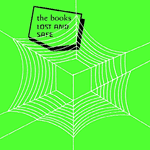|
|
 |
Dusted Reviews
Artist: The Books Album: Lost and Safe Label: Tomlab Review date: Apr. 13, 2005 |

|
|
|
 |
The term "cinematic" is oft-overused in music journalism, mostly tacked onto a distinct brand of wordless, spaced out instrumental music that some assume, in its spare use of notes and percussion, allows ample room for narrative. Such a signifier may seem out of place when dealing with the work of Paul DeJong and Nick Zammuto, otherwise known as the Books. And yet over the course of their first two records, they've carved out warmly evocative, electro-acoustic movies – snippets of random dialogue cribbed from home movies, television broadcasts and film that, when intermingled with sampled strings and finely edited guitars, conjures very specific images of time and place. The melodies danced around the edges instead sitting in the core, and like giddy teenagers in need of Ritalin, the duo always moved on before anything concrete could take hold.
Lost and Safe, DeJong and Zammuto's third full-length, is not entirely dissimilar to their previous efforts, but it features the duo tweaking their sound in subtle ways that make for an affecting, if not drastic, tangent. Gone are the immediately jarring and captivating transitions, the abrupt and seam-baring shifts between instruments and voices, replaced by a more nuanced use of the source material, a predilection for working out all of the possibilities of a given sound before moving on to a new idea. This is shown most obviously in Zammuto's vocals, which while evident on The Lemon of Pink, take on a more prominent role here. As a centerpiece for many of the tracks on the record, his voice is used less as a font for confessionals and observations and more as an instrumental glue to tie together the various threads hinted at by the disembodied characters. A quick glance at the lyrics reveals equal attribution to Zammuto and the many unnamed voices that emerge in the duo's samples.
One possible setback for Lost and Safe is the notion that the highs and lows of any given track aren't nearly as pronounced as they have been on previous works. This is only partly true – the first two Books' records always contained at least a couple of jaw dropping tracks that seem to be missing here on first listen. But closer examination reveals much deeper efforts, with the duo toying with the dynamics of their sound sources more than anything else. Several of the tracks on Lost and Safe could rank as the most powerful moments in the Books' catalogue – no small feat, all things considered. "Be Good to Them Always" slices DeJong's cello and plays it against the insistent percussive bounce of a basketball while Zammuto unifies the dejectedly misanthropic views of his sampled characters. "Vogt Dig for Kloppervok" takes a similar approach, this time mining strings for a percussive element that builds as Zammuto's voice fights against his own effects. "It Never Changes to Stop" is particularly haunting, pitting banjo against what might be an exasperated monologue of a high school teacher trying futilely to control his class.
The Books also find time throughout the course of the record to deviate from their own norms. "An Animated Discussion of Maps" revels in a stomping percussive clatter more so than the expected string work. "An Owl with Knees" sounds like it could have come from an earlier record, as it's one of the few stretches that work the familiar tension and melodic release that became a staple on earlier efforts.
Lost and Safe is undoubtedly a departure in some ways from the Books’ previous work. The tone is hushed, and the pace mostly laconic, reveling in the way the pieces come together inasmuch as the actual components themselves. While its effects are not nearly as immediate as they have been in the past, the album seems to open up new directions each time out. When Zammuto sings that "our heads were reeling with a glut of possibilities," it could just as well be the duo’s statement of purpose.
By Michael Crumsho
|







